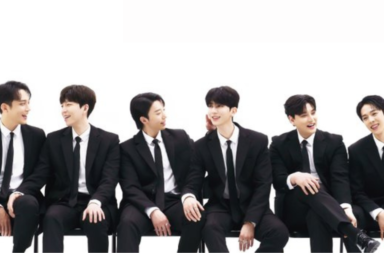 With a debut date harkening back to 2008, U-Kiss‘ comparative lack of commercial success for the past four years finally has people asking questions. With 2008-debut boy groups like SHINee, 2AM, and 2PM so far ahead in the K-pop idol race, U-Kiss’ stagnation in popularity and influence is puzzling.
With a debut date harkening back to 2008, U-Kiss‘ comparative lack of commercial success for the past four years finally has people asking questions. With 2008-debut boy groups like SHINee, 2AM, and 2PM so far ahead in the K-pop idol race, U-Kiss’ stagnation in popularity and influence is puzzling.
Earlier this year I wrote a piece arguing in favor of giving U-Kiss a second chance, noting the group’s rise in quality with Bran New Kiss and the potential for greater improvement in the future. U-Kiss has released two full-length albums and two-mini albums since Bran New Kiss, boasting music that should have been good enough to make a significant dent on the K-pop scene. The effort to grow U-Kiss into a respectable, high-quality group has been obvious, time and time again.
But despite these efforts, U-Kiss hasn’t moved much further from where they were several years ago. Sure, U-Kiss has since begun and upheld a stable career in the Japanese market, and they have a few international performance credits to their name — the group traveled to Colombia and Cambodia recently, making them some of the first Korean artists to hold events in either of those countries. But it hasn’t been enough to propel U-Kiss to the upper tiers of K-pop where their same-aged peers reside.
Don’t get me wrong, it’s great that U-Kiss has been able to meet with their fans in Colombia and Cambodia, but holding a fanmeeting in Phnom Penh just doesn’t have the same star-studded quality or pizzazz that comes with holding a showcase in London’s Abbey Road Studios (a la SHINee) or filming official Korea tourism campaigns broadcasted on television stations throughout Asia (a la 2PM). In addition, the U-Kiss members haven’t had enough network television airtime on big-name variety shows, and the cable television programs they’ve hosted (Chef Kiss, U-Kiss Vampire) haven’t picked up much of a following outside of the U-Kiss fandom. Indeed, it seems as if the main thing keeping U-Kiss afloat is their small but passionate fanbase. But besides that (and their consistently good music and music videos and, to some extent, live performances), U-Kiss has not maintained enough of a presence in the industry to keep themselves relevant.
By all logic, U-Kiss shouldn’t have survived for this long. Out of all the boy groups that debuted in 2008 under an “unknown” company, U-Kiss is the only survivor. Groups debuting under unknown companies in 2009 and 2010 also seemed to disappear within a year or two. With the exception of U-Kiss, there hasn’t been another group under the management of a small, unknown company who has managed to exist along the mainstream K-pop fold for so long. Nearly all of the current sunbae groups hail from larger entertainment companies, whereas most of the rookie groups are from small companies with odious sounding two-initial names.
 U-Kiss is the only active group currently under NH Media (since it seems NH is intent on using Paran as a resource for spare parts) , and it would be safe to assume that the vast majority of resources has gone towards funding U-Kiss. This explains the consistent high quality of U-Kiss’ material in the past two years, as well as U-Kiss’ numerous cable television appearances, sporadically planned overseas visits, and a surprising hookup deal with Avex in Japan. But as a small company, NH Media lacks the amount of industry influence that SM, JYP, and YG have. Granted, a lot of this probably has to do with the fact that the Big Three have been around for a lot longer than NH Media, and have had a lot more time to network and build up good relationships throughout the broadcast and creative media spheres. And having heavy influence over an entire industry is, obviously, a very big deal — it affects the shows your idols go on, the amount of camera time your idols get, the PDs your idols work with, the products your idols endorse. This invariably translates into the amount of fans in your idols’ fanbase, the amount and spread of public recognition your idols receive, the amount of international recognition your idols have, et cetera, et cetera, et cetera.
U-Kiss is the only active group currently under NH Media (since it seems NH is intent on using Paran as a resource for spare parts) , and it would be safe to assume that the vast majority of resources has gone towards funding U-Kiss. This explains the consistent high quality of U-Kiss’ material in the past two years, as well as U-Kiss’ numerous cable television appearances, sporadically planned overseas visits, and a surprising hookup deal with Avex in Japan. But as a small company, NH Media lacks the amount of industry influence that SM, JYP, and YG have. Granted, a lot of this probably has to do with the fact that the Big Three have been around for a lot longer than NH Media, and have had a lot more time to network and build up good relationships throughout the broadcast and creative media spheres. And having heavy influence over an entire industry is, obviously, a very big deal — it affects the shows your idols go on, the amount of camera time your idols get, the PDs your idols work with, the products your idols endorse. This invariably translates into the amount of fans in your idols’ fanbase, the amount and spread of public recognition your idols receive, the amount of international recognition your idols have, et cetera, et cetera, et cetera.
U-Kiss is branded as the same type of idol group as their counterparts signed to the Big Three, and U-Kiss often produces higher quality material than that of these bigger-name idol groups. In other words, U-Kiss is playing the exact same game as SHINee, 2PM, and any other group with four candles on its anniversary cake. In fact, there are plenty of times where U-Kiss is playing the game better, especially when it comes to the quality of their material. But the only thing that separates U-Kiss from these big-name idols is the fact that they’re signed to a company with limited industry influence and a comparatively teensy reputation.
This is relevant in light of the recent surge of rookie groups — or more specifically, the recent surge of rookie groups debuting under unknown companies. These “nugu” (literally, “who” in Korean) groups range from the noteworthy (e.g. Sistar) to the barely relevant (e.g. Nine Muses). But while groups like Sistar, Teen Top, Secret, and ZE:A seem to be some of the biggest K-pop groups of the moment, they’ve also only been around for less than two years, and the relative newness of these groups makes it very difficult to predict their future success.
 Of course, one can’t ignore the fact that there are some extraordinarily talented people nested in these “nugu” groups, and it just doesn’t make any logical sense to say that Hyorin of Sistar is almost guaranteed a shorter career than Sohee of Wonder Girls just because Sohee is signed to JYP Entertainment and Hyorin is signed to Starship Entertainment. But this just goes to show how important a company’s industry influence is in order for the artists under their label (and, at times, the company itself) to survive. In the end, the mystery behind U-Kiss’ lack of success boils down to the simple equation of power, wealth, and influence.
Of course, one can’t ignore the fact that there are some extraordinarily talented people nested in these “nugu” groups, and it just doesn’t make any logical sense to say that Hyorin of Sistar is almost guaranteed a shorter career than Sohee of Wonder Girls just because Sohee is signed to JYP Entertainment and Hyorin is signed to Starship Entertainment. But this just goes to show how important a company’s industry influence is in order for the artists under their label (and, at times, the company itself) to survive. In the end, the mystery behind U-Kiss’ lack of success boils down to the simple equation of power, wealth, and influence.
As the K-pop phenomenon reaches an increasingly global audience and becomes faster paced with the widespread integration of social media and the Internet, the word “K-pop” itself has begun to develop a separate definition, deviating from its original meaning as an abbreviated form of the term “Korean pop [culture].” The word “K-pop” as it currently stands seems to place more of an emphasis on the fast-paced consumption of “idols” and and less on the musical and cultural legacy of “Korean pop artists” (when “idols” and “Korean pop artists” are, in fact, one and the same).This can easily be personified by the increasing popularity of the mini-album format and the scarcity of the full-album. In a way, this captures the essence of pop music: fast, easily digestible fluff in a pretty packaging with an expiration date two years from now. It makes sense that smaller companies with limited access to resources and connections would be more inclined to create a product that fits the definition of “K-pop” as it currently stands — a group with pretty faces, appealing personalities, catchy songs, and a high potential of making fast cash.
 It has become the unspoken expectation for groups like F.Cuz, Dal Shabet, Boyfriend, and Girl’s Day to patter out into irrelevancy within a few years, because let’s be honest: is there anyone who seriously sees Boyfriend selling out concert arenas throughout Asia and winning all-kills on music shows three years from now? The U-Kiss of 2008 is very similar to the “nugu” idol groups of 2012, and one wonders exactly which of these groups will disappear from the scene within a few years. At the same time, it’s also interesting to think about which groups will manage to stick around for a few more years and, like U-Kiss, take on that horribly awkward role of “underappreciated sunbae” while all the rookies from the Big Three are sprinting ahead.
It has become the unspoken expectation for groups like F.Cuz, Dal Shabet, Boyfriend, and Girl’s Day to patter out into irrelevancy within a few years, because let’s be honest: is there anyone who seriously sees Boyfriend selling out concert arenas throughout Asia and winning all-kills on music shows three years from now? The U-Kiss of 2008 is very similar to the “nugu” idol groups of 2012, and one wonders exactly which of these groups will disappear from the scene within a few years. At the same time, it’s also interesting to think about which groups will manage to stick around for a few more years and, like U-Kiss, take on that horribly awkward role of “underappreciated sunbae” while all the rookies from the Big Three are sprinting ahead.
Despite their comparative lack in popularity and commercial success, U-Kiss has put out a lot of good music and has earned a loyal fan following. But despite this, it’s a little hard to look at U-Kiss and not see a group that’s fighting a losing battle against the system. U-Kiss has released some of the best material to come out of K-pop this year; I haven’t met a single person who’s listened to U-Kiss’ recent music and disliked it. But the real problem rests with the gap between those who have made an effort to listen to U-Kiss’ music and those who haven’t. Unlike big entertainment companies, U-Kiss’ management isn’t strong enough to shove U-Kiss’ music into every nook and cranny of the Korean entertainment scene in order to give it the amount of public exposure needed to propel U-Kiss into the higher echelons of the Korean pop scene. Many of these smaller entertainment companies are now struggling with the same problem, which might offer an explanation as to why so many of the latest K-pop singles sound like poor attempts at being catchy earworms. Of course, the constant influx of new rookie groups with catchy material helps to keep the K-pop scene fresh and fun. But at the same time, it reminds us of the inherently time-restricted and dog-eat-dog nature of K-pop.
(Korea.com, The Cambodia Herald, Touch Korea, SM Entertainment, Kpoplists, Nate; images via Yonhap News, Kpop Star, Starship Entertainment)


